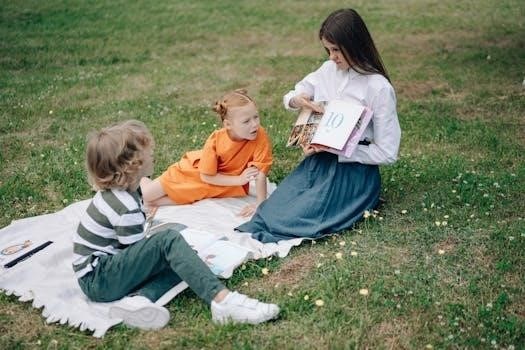
Act 1 Overview
Act 1 establishes the play’s setting in Verona, a city plagued by a feud between the Montague and Capulet families. This conflict is central to the plot and sets the stage for the tragic events to unfold, involving two young lovers.
The play opens in Verona, a city where a long-standing and bitter feud between two prominent families, the Montagues and the Capulets, has disrupted the peace. This conflict serves as the backdrop for the entire tragedy, creating an atmosphere of tension and violence. The audience is immediately introduced to the animosity between the two houses, which is a core element of the narrative. This feud is not just between the heads of the families, but also extends to their servants and younger generations. The play highlights how this social conflict affects every level of Verona’s society. The audience witnesses the initial sparks of this feud, setting the stage for the tragic romance.

Scene 1 Analysis
Scene 1 presents a chaotic street brawl between the Capulet and Montague servants. This scene showcases the deep-seated hatred that fuels the feud and introduces key characters involved in the conflict.
The Opening Street Brawl
The play opens with a comical yet violent street brawl involving Sampson and Gregory, two Capulet servants, who engage in provocative banter against the Montagues. This escalates quickly, demonstrating the underlying tension between the two houses. The fight begins with crude jokes and gestures, like biting a thumb, a sign of disrespect that immediately ignites the conflict. The brawl sets the stage for the play’s themes of conflict and violence, and the deep-rooted animosity is immediately apparent to the audience, highlighting the volatile atmosphere within Verona. The scene is a mix of comedy and impending tragedy, a staple of Shakespeare’s dramatic style.
The opening scene introduces key characters. Sampson and Gregory, Capulet servants, are portrayed as brash and eager for a fight, using bawdy language. Benvolio, a Montague, attempts to quell the violence, showing his peace-loving nature. Tybalt, a Capulet, is quick to anger and fiercely loyal to his family, directly contrasting with Benvolio’s behavior. This contrast sets up the core conflict in the play, where characters fall into two groups⁚ those who prefer to fight and those who don’t. The scene establishes the opposing personalities and loyalty within the rival families. These introductions highlight the diverse responses to the feud.
Escalation of the Feud
The initial street brawl demonstrates how easily the feud escalates. What begins as a petty argument between servants quickly involves more people, including Benvolio and Tybalt. The use of provocative gestures, like biting a thumb, highlights the deep-seated animosity. Benvolio tries to stop the fight, but Tybalt’s arrival escalates the situation. This scene showcases how quickly a simple interaction can become a full-blown conflict. The established tension between the families is not just the result of a few people, but rather a pervasive conflict that dominates the lives of Verona’s citizens. This scene foreshadows the violence that will plague the play.
Scene 2 Analysis
Scene 2 explores Paris’s marriage proposal to Capulet, Romeo’s lovesickness for Rosaline, and the accidental invitation to the Capulet feast. It sets the stage for Romeo and Juliet’s meeting.
Paris’s Proposal to Capulet
In this scene, Count Paris seeks Capulet’s consent to marry his daughter, Juliet. Capulet, though initially hesitant due to Juliet’s young age, expresses a willingness to consider the match. He invites Paris to the Capulet feast, suggesting that he woo Juliet and win her affection. This proposal highlights the social customs of the time, where marriages were often arranged for strategic or financial reasons, and the father’s consent was essential. This sets up a conflict for Juliet as she is not interested in marriage.
Romeo’s Unrequited Love for Rosaline
Prior to meeting Juliet, Romeo is deeply infatuated with Rosaline, who does not return his affections. Romeo’s love for Rosaline is characterized by the language of courtly love, filled with dramatic declarations of despair and longing. He is portrayed as lovesick and melancholy, spending his time pining for her. This unrequited love serves as a stark contrast to the passionate and reciprocal love he experiences with Juliet later in the play. It also sets the stage for his emotional transformation once he encounters Juliet, making his love for her more profound by comparison.
The Invitation to the Capulet Feast
A pivotal moment in Act 1 is the accidental invitation to the Capulet feast, received by Romeo through a servant. This invitation, intended for those on the guest list, is intercepted, and the illiterate servant asks Romeo to read it for him. Romeo and Benvolio, learning of the party, decide to attend, hoping to see Rosaline. Benvolio sees this as an opportunity for Romeo to meet other women. This seemingly chance event is crucial to the plot, as it is at this feast where Romeo will meet Juliet, setting in motion the tragic events that follow.

Scene 3 Analysis
Scene 3 delves into Juliet’s world, showcasing her relationship with her mother and the Nurse. The focus is on Juliet’s upcoming marriage, revealing her initial reluctance towards the prospect.
Lady Capulet and the Nurse Discuss Juliet’s Marriage
In this scene, Lady Capulet and the Nurse engage in a conversation about Juliet’s potential marriage to Paris. Lady Capulet, adhering to societal expectations, sees marriage as a practical arrangement, primarily for social advancement. The Nurse, on the other hand, offers a more personal and somewhat bawdy perspective, recalling Juliet’s childhood. The Nurse’s long-windedness contrasts with Lady Capulet’s more formal tone. This conversation reveals the generational differences in their views on love and marriage, highlighting the expectations placed upon young women in their society. They prepare Juliet for the arrival of Paris.
Juliet’s Initial Reluctance Towards Marriage
Juliet, upon hearing of her potential marriage to Paris, expresses a notable reluctance; Unlike her mother and nurse, Juliet doesn’t eagerly anticipate marriage; she displays a thoughtful and hesitant demeanor. Her responses suggest a lack of personal desire for the match, emphasizing her youth and inexperience in matters of love and marriage. Juliet’s initial passivity and obedience to her parents’ wishes, sets her apart from the more assertive characters. Her reluctant acceptance reveals the limited agency she possesses within her patriarchal society, foreshadowing the conflict between personal desire and family expectations.

Scene 4 Analysis
Scene 4 explores Romeo’s apprehension about attending the Capulet feast. It also introduces Mercutio’s famous Queen Mab speech, highlighting the power of dreams and imagination in the play.
Romeo’s Hesitations About the Feast
Prior to attending the Capulet’s feast, Romeo expresses a sense of foreboding and unease. He is still consumed by his unrequited love for Rosaline, and feels a heavy heart, believing that this party will only bring him more pain. He seems to have a premonition that something significant and potentially negative will occur. His friends, Mercutio and Benvolio, attempt to cheer him up and convince him that attending the feast is a good idea. Despite their efforts, Romeo remains hesitant, suggesting a deeper awareness of the potential for conflict or misfortune.
Mercutio’s Queen Mab Speech
Mercutio, in an attempt to lift Romeo’s spirits before the Capulet’s feast, launches into a fantastical and whimsical speech about Queen Mab. He describes her as a tiny fairy who delivers dreams to people, often reflecting their deepest desires and anxieties. The speech is filled with vivid imagery and wordplay, showcasing Mercutio’s imaginative and cynical nature. It serves as a way to mock the romantic notions of love and dreams that Romeo holds. The Queen Mab speech is also a display of Mercutio’s wit and a stark contrast to Romeo’s romantic and melancholic mood. It highlights the different perspectives on love and fate within the play.

Scene 5 Analysis
This scene is pivotal as Romeo and Juliet meet for the first time, their attraction instant and powerful. Tybalt recognizes Romeo, which leads to anger. The scene ends with the revelation of their families’ rivalry.
Romeo and Juliet’s First Meeting
At the Capulet feast, Romeo, initially intending to see Rosaline, is captivated by Juliet’s beauty. Their first interaction is filled with poetic language and shared sonnets, symbolizing their immediate and intense connection. This encounter transcends the social hierarchy, as Romeo, a Montague, falls deeply in love with Juliet, a Capulet. The meeting establishes the central romance, making their forbidden love the core of the play. It is a moment of pure, unadulterated passion, foreshadowing the tragedy to come as their families are sworn enemies. This sets the stage for the play’s central conflict.
Tybalt’s Recognition of Romeo and Anger
During the Capulet feast, Tybalt, Juliet’s cousin, recognizes Romeo as a Montague. This recognition immediately sparks his anger and hatred, fueled by the long-standing feud between their families. Tybalt views Romeo’s presence as a direct insult and a violation of Capulet’s house, intensifying his desire for confrontation. His reaction highlights the deep-seated animosity that exists between the two families. Tybalt’s rage introduces a critical element of conflict, foreshadowing the escalating violence. His desire to challenge Romeo further fuels the play’s tension, setting the stage for future confrontations and adding to the tragic circumstances of the lovers.
The Revelation of Their Families’ Rivalry
After their initial encounter, Romeo and Juliet each discover the identity of the other, learning that they belong to the rival Montague and Capulet families. This revelation is a devastating blow, as they realize the immense obstacle their families’ feud presents to their newfound love. The knowledge of their families’ animosity brings a sense of despair and foreboding; This discovery highlights the tragic irony of their situation – their love is born amidst a hateful conflict, making their relationship forbidden and dangerous. The revelation sets the stage for the play’s central conflict⁚ the clash between love and family loyalty.